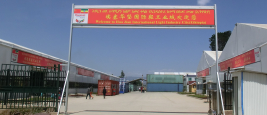
China’s Belt and Road – Towards Globalization with Chinese Characteristics? Ifri-OCP Policy Center Roundtables
In 2013, Chinese president Xi Jinping first unveiled his broad vision to develop regional connectivity and infrastructure across Eurasia that would later be officially named the Belt and Road Initiative (or yi dai yi lu, One Belt, One Road, or OBOR).
The initiative has emerged as a central narrative of Xi’s foreign policy, and China has already committed an estimated $300 billion in financing for infrastructure projects such as roads, railways, ports, power plants and telecommunications hardware across Asia to the Middle East, Europe and Africa. Some estimate the figure could reach $1 trillion over the next decade. Moving beyond physical infrastructure, China hopes to make OBOR a catalyst for developing the so-called “five connectivities” to include infrastructure, finance, commerce, people-to-people exchanges and policy coordination – in effect taking on a more normative role in shaping the regional economic and social order. By now opening the initiative up to all countries and regions of the world, China is seemingly looking to develop OBOR into a broad-ranging platform for coordinating regional development and, possibly, global governance.
China is clearly seeking to articulate a more proactive stance in regional and global affairs, even staking out a leadership role for itself in a context where Western leadership has been faltering. Offering the promise of long-term economic development and growth, China is uniquely placed to drive the regional economic agenda, or perhaps even a new wave of globalization with Chinese characteristics. But China will not go unchallenged in its efforts, as other regional players such as India, Japan and Russia seek to position themselves in a rapidly changing geopolitical environment. China’s own internal challenges, to include a profound economic transformation and rapidly rising debt, help to shape the OBOR narrative, but also risk derailing the initiative.
This conference will explore many of the drivers, challenges and implications of OBOR, analyzing first the project in a Chinese context before delving into the regional implications for South and Southeast Asia, Russia and Central Asia, and Africa.
For more information, please contact Lea Metke, Project Officer to the Director (metke@ifri.org).

Since the fall of the Derg regime in 1991, cordial relations have developed between China and Ethiopia, forming a positive political backdrop in front of which the two countries’ interests have increasingly converged.
More than three years have already passed since China’s new silk roads were launched by President Xi Jinping. When he first mentioned the idea in an autumn 2013 speech in Kazakhstan, questions quickly emerged on the meaning of this general concept, which soon became widely promoted through a...





